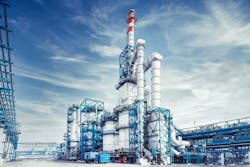Gazprom Neft commissions revamped unit at Omsk refinery
PJSC Gazprom Neft subsidiary JSC Gazpromneft-ONPZ has completed major upgrades to an existing unit at its 430,000-b/d Omsk refinery in Western Siberia to increase efficiency of diesel production as part of the second phase of the operator’s ongoing modernization program to reduce environmental impacts and improve processing capacities, conversion rates, energy efficiency, and production qualities.
As part of the 800 million-ruble modernization of the refinery’s 3 million-tonnes/year diesel hydrotreating unit, Gazpromneft-ONPZ replaced pumping and heat exchange equipment to enable a 10% increase in the volume of diesel fuel production at the installation as of Mar. 19, Gazprom Neft said.
Revamp of the diesel hydrotreating unit comes in addition to Gazpromneft-ONPZ’s ongoing construction of a new 2.5 million-tpy diesel hydrotreating and dewaxing plant scheduled to be completed in 2021, according to the operator.
Additional Omsk modernization works
As part of the broader modernization work at Omsk, Gazpromneft-ONPZ also is progressing with construction of a new primary crude refining complex as well as a project to expand delayed coking capacity at the site (OGJ Online, Feb. 19, 2020; Nov. 18, 2019).
As of Feb. 7, installation of new atmospheric and vacuum distillation columns was completed, as was construction of all foundations and reinforced concrete structures. Installation of underground services and utilities, pipelines, and automated control systems as part of the project remains ongoing. With a production capacity of 8.4 million tpy, the new complex will feature a suite of technologies designed to reduce emissions at the site, including ongoing monitoring of environmental impacts as well as a closed-loop equipment drainage system that will allow recoverable oil products to be sent for recycling. Following startup of the new complex, Gazprom Neft also will decommission six existing but obsolete units at the refinery, further reducing the site’s overall environmental footprint.
Late in 2019, the Omsk refinery took delivery of new high-tech equipment designed to produce components for automotive gasoline as part of a delayed coking upgrade and expansion project, which includes construction of a 40,000-b/d delayed coking unit at the site.
Once in operation in 2021, the reconstructed delayed coking complex—which will reduce environmental impacts and improve refining efficiency at the site—will enable full processing of heavy oil fractions to increase gasoline and diesel production at the refinery, as well as produce 38,700 tpy of needle coke.
Together with other projects forming the second phase of the Omsk refinery’s modernization project, the revamped coking complex will increase the site’s conversion rate to 97% and increase light-product yield to 80%.
Gazprom Neft—which previously confirmed completion of installation of three major coking ovens, each 28.5 m long and weighing 197 tonnes—said it also will replace process heaters and secondary refining columns, as well as add an additional tank farm and automated control system, as part of the more-than 50 billion-ruble coking reconstruction project (OGJ Online, Sept. 13, 2019).
About the Author
Robert Brelsford
Downstream Editor
Robert Brelsford joined Oil & Gas Journal in October 2013 as downstream technology editor after 8 years as a crude oil price and news reporter on spot crude transactions at the US Gulf Coast, West Coast, Canadian, and Latin American markets. He holds a BA (2000) in English from Rice University and an MS (2003) in education and social policy from Northwestern University.

